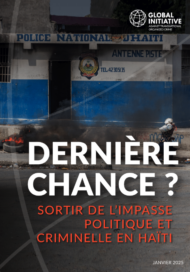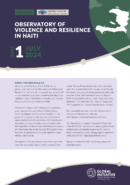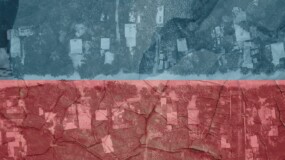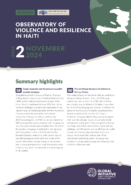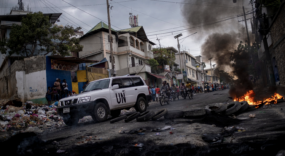Haiti is at a crossroads, facing an unprecedented politico-criminal crisis. In 2024, gang violence escalated to record levels, with criminal groups controlling 85% of Port-au-Prince and expanding across provinces. Over 1 million people were displaced, and at least 5 601 murders were recorded in 2024, an increase of more than 1 000 victims compared to 2023, equivalent to an annual homicide rate of almost 48 per 100 000 inhabitants, a national record.
Beyond the security dimension, 2024 was marked by shifts in the gangs’ strategy. Three key developments stand out.
Firstly, the gangs forged a criminal coalition known as Living Together (Viv Ansanm, in Haiti creole). Through this collaboration, the gangs consolidated their capacity for criminal governance, which they have enforced through extortion and the enactment of ever stricter rules over the daily life of Haitians. Finally, through their capacity for violence and by increasing their voice in public debate, criminal leaders have influenced the course of the country’s political transition, to put pressure on Haitian authorities and the international community, and to become more embedded than ever in Haiti’s political and economic system.
Meanwhile, the Haitian Police and the Kenyan-led Multinational Security Support mission remain tactically and operationally overwhelmed by adversaries who have vastly increased their arsenals and territorial control. While Haitian people are subjected to unprecedented human rights violations, the pathway to resolving the crisis has reached an operational and conceptual impasse.
This Brief offers avenues of action for 2025. It begins by outlining how the gangs’ governance has developed alongside the inadequacy of the current public security strategy, before looking at the political challenges ahead for Haiti’s transition and the international community. To have a significant impact, the Brief makes the case for a paradigm shift in the national and international response, which must take full account of the Haitian organized crime ecosystem. The challenge is immense, but the tools are at our disposal to forge joint action in the face of a criminal crisis that is unique on a global scale.
The Brief outlines critical steps, including:
- Providing more resources to the strategic analysis of the political economy of violence in Haiti, at the political and operational levels.
- Bolstering the HNP and MSS with funding, personnel, and strategic coordination.
- Investing in the criminal justice system, to act against the actors that fuel illicit activities.
- Relaunching Haiti’s political transition with an emphasis on transparency and accountability.
- Establishing a cohesive sanctions and arms embargo regime targeting gang financiers and enablers, in Haiti and abroad.
- Strengthening the international and national implementation of sanctions and the arms embargo.
- If a peacekeeping operation were deployed, building a transition strategy that would focus on adapting it to an organized crime mandate.
- Designing a coherent disarmament, demobilization, and community violence-reduction strategy.
The pathway to peace requires addressing systemic impunity and rebuilding governance, A peacekeeping operation alone will not be the panacea that will cure Haiti’s gang problem and the structures that support the criminal groups. This is a far greater challenge, requiring the deployment of all available domestic and international instruments, including a mix of public security, justice, development aid and humanitarian cooperation.
By addressing root causes and ensuring coordinated action, Haiti can begin to dismantle the structures that perpetuate its crisis and move toward a future of stability and self-determination.
To receive regular updates about the Haiti Observatory, please subscribe to our mailing list and get the latest information delivered to your inbox.
Dernière chance ? Sortir de l’impasse politique et criminelle en Haïti
Haïti est à un carrefour, confronté à une crise politico-criminelle sans précédent. En 2024, la violence des gangs a atteint des niveaux record : des groupes criminels contrôlent 85 % de Port-au-Prince et étendent leur influence aux provinces. Plus d’un million de personnes ont été déplacées, et au moins 5 601 meurtres ont été enregistrés en 2024, soit une augmentation de plus de 1 000 victimes par rapport à 2023, ce qui correspond à un taux d’homicides annuel de près de 48 pour 100 000 habitants, un record national.
Au-delà de la dimension sécuritaire, l’année 2024 a été marquée par des évolutions stratégiques dans les activités des gangs. Trois développements clés se démarquent :
Premièrement, les gangs ont formé une coalition criminelle appelée «Vivre ensemble» (Viv Ansanm, en créole haïtien). Grâce à cette collaboration, ils ont renforcé leur capacité à exercer une gouvernance criminelle, imposée par l’extorsion et des règles de plus en plus strictes sur la vie quotidienne des Haïtiens. Enfin, par leur capacité à utiliser la violence et à peser dans le débat public, les chefs criminels ont influencé le processus de transition politique, exerçant des pressions sur les autorités haïtiennes et la communauté internationale, et s’intégrant plus profondément que jamais dans les systèmes politique et économique d’Haïti.
Pendant ce temps, la Police nationale haïtienne (PNH) et la Mission multinationale de soutien à la sécurité dirigée par le Kenya restent dépassées sur les plans tactique et opérationnel face à des adversaires qui ont considérablement accru leur arsenal et leur contrôle territorial. Alors que le peuple haïtien subit des violations des droits humains sans précédent, la résolution de la crise est dans une impasse tant sur le plan opérationnel que conceptuel.
Ce Brief propose des pistes d’action pour 2025. Il commence par examiner comment la gouvernance des gangs s’est développée parallèlement à l’insuffisance de la stratégie actuelle de sécurité publique, avant d’analyser les défis politiques qui attendent la transition haïtienne et la communauté internationale. Pour avoir un impact significatif, le Brief plaide en faveur d’un changement de paradigme dans la réponse nationale et internationale, qui doit pleinement intégrer l’écosystème du crime organisé en Haïti. Le défi est immense, mais les outils à notre disposition permettent de mener une action concertée face à une crise criminelle unique à l’échelle mondiale.
Le Brief expose des étapes critiques, notamment :
- Allouer davantage de ressources à l’analyse stratégique de l’économie politique de la violence en Haïti, aux niveaux politique et opérationnel.
- Renforcer la PNH et la MSS par des financements, du personnel et une coordination stratégique.
- Investir dans le système de justice pénale pour agir contre les acteurs alimentant les activités illicites.
- Relancer la transition politique en Haïti en mettant l’accent sur la transparence et la redevabilité.
- Mettre en place un régime cohérent de sanctions et d’embargo sur les armes ciblant les financiers et facilitateurs des gangs, en Haïti et à l’étranger.
- Renforcer la mise en œuvre nationale et internationale des sanctions et de l’embargo sur les armes.
- En cas de déploiement d’une opération de maintien de la paix, concevoir une stratégie de transition adaptée à un mandat axé sur le crime organisé.
- Élaborer une stratégie cohérente de désarmement, de démobilisation et de réduction de la violence communautaire.
Le chemin vers la paix exige de s’attaquer à l’impunité systémique et de reconstruire la gouvernance. Une opération de maintien de la paix ne sera pas une solution miracle pour résoudre le problème des gangs et les structures qui les soutiennent. Le défi est bien plus vaste et nécessite le déploiement de tous les instruments disponibles, à la fois nationaux et internationaux, combinant sécurité publique, justice, aide au développement et coopération humanitaire.
En s’attaquant aux causes profondes et en assurant une action coordonnée, Haïti peut commencer à démanteler les structures qui perpétuent sa crise et avancer vers un avenir de stabilité et d’autodétermination.

